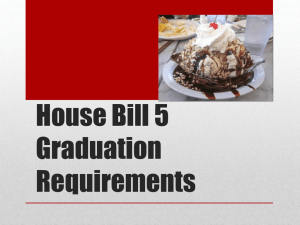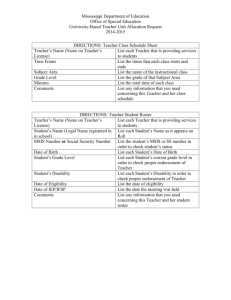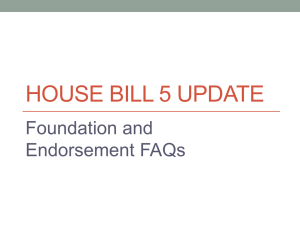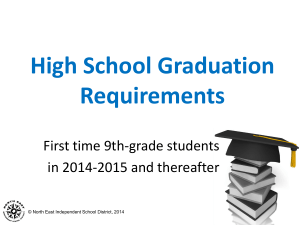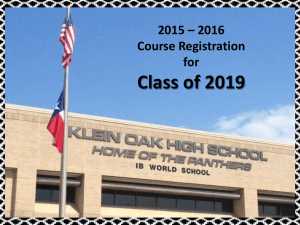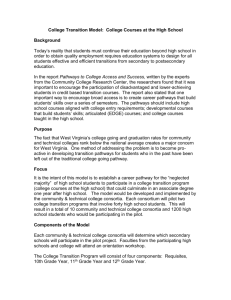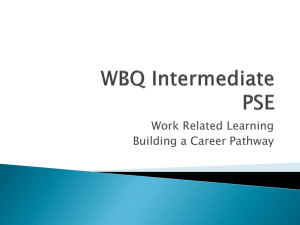docx - Northern Illinois University
advertisement
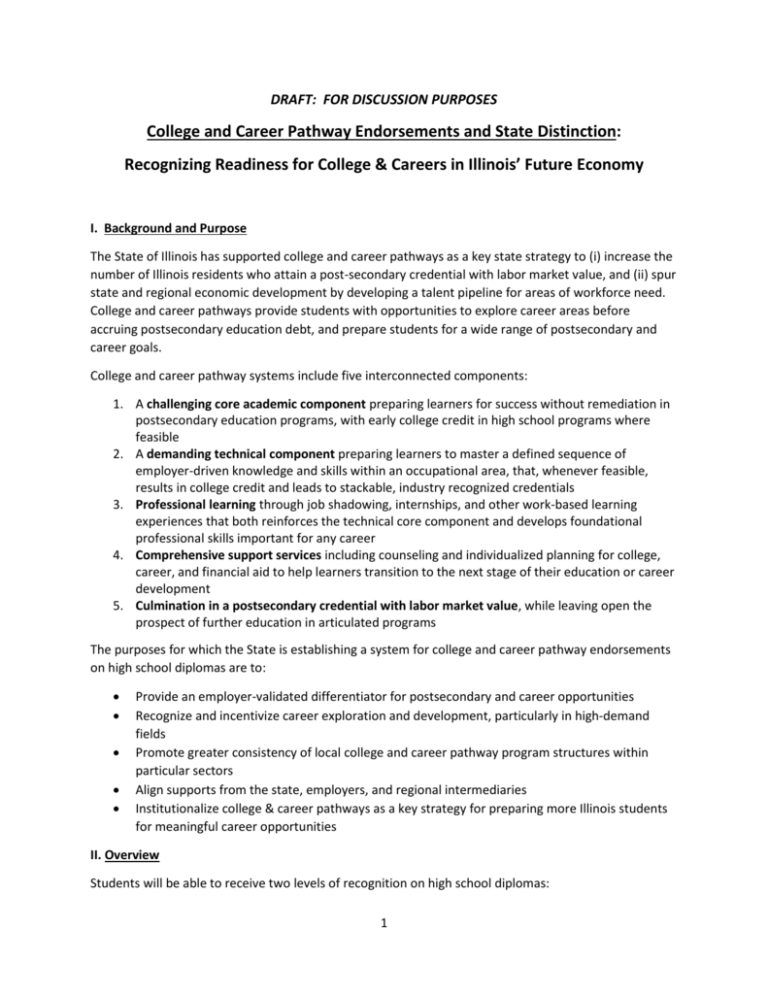
DRAFT: FOR DISCUSSION PURPOSES College and Career Pathway Endorsements and State Distinction: Recognizing Readiness for College & Careers in Illinois’ Future Economy I. Background and Purpose The State of Illinois has supported college and career pathways as a key state strategy to (i) increase the number of Illinois residents who attain a post-secondary credential with labor market value, and (ii) spur state and regional economic development by developing a talent pipeline for areas of workforce need. College and career pathways provide students with opportunities to explore career areas before accruing postsecondary education debt, and prepare students for a wide range of postsecondary and career goals. College and career pathway systems include five interconnected components: 1. A challenging core academic component preparing learners for success without remediation in postsecondary education programs, with early college credit in high school programs where feasible 2. A demanding technical component preparing learners to master a defined sequence of employer-driven knowledge and skills within an occupational area, that, whenever feasible, results in college credit and leads to stackable, industry recognized credentials 3. Professional learning through job shadowing, internships, and other work-based learning experiences that both reinforces the technical core component and develops foundational professional skills important for any career 4. Comprehensive support services including counseling and individualized planning for college, career, and financial aid to help learners transition to the next stage of their education or career development 5. Culmination in a postsecondary credential with labor market value, while leaving open the prospect of further education in articulated programs The purposes for which the State is establishing a system for college and career pathway endorsements on high school diplomas are to: Provide an employer-validated differentiator for postsecondary and career opportunities Recognize and incentivize career exploration and development, particularly in high-demand fields Promote greater consistency of local college and career pathway program structures within particular sectors Align supports from the state, employers, and regional intermediaries Institutionalize college & career pathways as a key strategy for preparing more Illinois students for meaningful career opportunities II. Overview Students will be able to receive two levels of recognition on high school diplomas: 1 College & Career Pathway Endorsements available in broad career areas aligned to the Illinois Career Cluster framework, as determined by ISBE in consultation with the other IPIC agencies1 and stakeholders (see Attachment 1 for an example framework for endorsement areas). In addition, a Multidisciplinary Endorsement is available for students changing pathways while in high school. State Distinction available where a statewide public-private steering committee including business, secondary, and postsecondary representatives has defined competencies aligned to economic development and workforce needs. For example, a student could attain a STEAM Endorsement with Manufacturing State Distinction. State agencies and business-led sector-based partnerships will designate various career-oriented instructional programs (e.g., Project Lead the Way, FFA, etc.) that meet some or all of the criteria for Endorsements and State Distinction. III. College & Career Pathway Endorsements For any College & Career Pathway Endorsement, the student must complete all of the following: 1 Individualized Plan: Have an individualized plan for college, career, and financial aid that is updated annually during high school; a resume; and a personal statement. Career-Oriented Course Sequence: Complete at least two years of coursework or equivalent competencies within the endorsement area. ISBE will define the course codes that are within each endorsement area. The district and a local community college must certify to ISBE and ICCB that the course or competency sequence is articulated to a postsecondary credential (certificate or degree program). Professional Learning: Complete: i. at least two employer-led career exploration experiences. Such experiences may include a job shadow, attendance at a career exposition, or structured employer site visits. ii. at least two team-based challenges or projects relating to the endorsement area with professional mentoring (which may be either in school or out-of-school). iii. at least one paid or for-credit supervised career development experience (SCDE) in which students engage in authentic and relevant work relating to the endorsement area, with an employer or supervisor assessment of foundational professional skills. SCDEs may include internships, school-based enterprises, career-exploration camps, Supervised Agricultural Experiences, or research apprenticeships. The SCDE, or a combination of SCDEs, must be at least 60 cumulative hours. The assessment of foundational professional skills must address, at minimum, the areas of work ethic, professionalism, communication, collaboration and interpersonal skills, and problemsolving. The assessment is to be used a feedback tool for students and learning strategy; not as a “high stakes” assessment for a grade or credit determination. Academic Readiness: Must demonstrate readiness for non-remedial coursework in reading and math by high school graduation through criteria certified by the school district and a local The Illinois Pathways Interagency Committee (IPIC) agencies include ISBE, ICCB, IBHE, ISAC, DCEO, and IDES. 2 community college to ISBE and ICCB. This may be demonstrated through various methods, including assessment scores, GPA, course completions, or other locally-adopted criteria. ISBE, in consultation with IPIC agencies and other stakeholders, will develop specific criteria for endorsement requirements and guidance documents for implementation. IV. State Distinction Periodically as part of federal and state economic development planning processes, the IPIC Agencies will designate industry sectors in which State Distinction will be available based on projected state economic development and workforce needs. Within each sector, a public-private steering committee designated by the IPIC agencies and involving business-led, sector-based partnership(s) will identify a sequence of career competencies for occupational pathways within that sector that students should attain by high school graduation in a demanding technical course of instruction. Regional modifications to these competencies may be allowed, provided any regional modifications must be approved by the state steering committee. Students can receive State Distinction within a sector/occupational area if: i. ii. iii. iv. the student meets the requirements for the applicable College & Career Pathway Endorsement, except that the SCDE, or combination of SCDEs, must be 120 cumulative hours; the student demonstrates mastery of the identified career competencies; the student attains at least six hours of early college credit within the career area (which may be articulated credit, advanced placement, or dual credit); and the district offers a “State Distinction Qualifying Program” meeting the below requirements. To receive designation as a State Distinction Qualifying Program, the school district, a local community college, and LWIB must certify to ISBE, ICCB, and DCEO that the program: i. ii. iii. addresses a priority industry sector for regional economic development, or is certified to relate to one or more occupational areas with a sufficient number of regional employment opportunities to support the program’s establishment; involves at least 3 employer partners in its ongoing administration; and has been jointly developed with at least one local community college and the LWIB, and culminates in a postsecondary credential with labor market value that has opportunities for ongoing student advancement. The IPIC Agencies, in collaboration with other public and private partners, will develop recognition and incentives for students completing a College and Career Pathway Endorsement with State Distinction. Examples of recognition and incentives include: Scholarships Priority for internship placements with business partners Recognition at statewide convenings Guaranteed transfer of credit into degree programs Targeted outreach and counseling supports for postsecondary education and career placement 3 V. Statewide Supports The IPIC agencies will, by no later than June 30, 2017, develop a comprehensive interagency plan for supporting the development of college and career pathways throughout the State of Illinois. Thereafter, the plan must be re-assessed and updated at least once every five years. The plan will articulate a strategy for supporting college and career pathways that includes state and federal funding, business and philanthropic investments, and local investments. The plan will also address how college and career pathway and state distinction programs articulate to postsecondary degree programs. In accordance with the plan, and to support local establishment and administration of College and Career Pathway Endorsements and State Distinction programs, the IPIC Agencies will: Periodically designate priority state-level sector and occupational areas as part of federal and state economic development planning processes, with annual reports on supply and demand forecasts within those areas Implement a statewide communications strategy raising student and family of career pathway endorsements and encouraging employer engagement Provide or designate one or more web-based tools to support college and career pathways, including: o web-based professional learning portfolio (districts may use existing systems, such as FFA or Career Cruising, for this documentation) o web-based employability assessment o web-based mentoring platform Provide a statewide insurance policy for work-based learning activities Provide a model career cluster orientation course aligned to the Endorsement and State Distinction framework Coordinate with business-led sector-based partnerships to: o Provide employer input into the career competencies within their sector area, as adjusted periodically based on industry needs o Designate “out-of-the-box” curriculum that can meet the competency requirements, or curriculum that can meet the requirements with adjustments/supplements o Designate industry-based certifications that signify mastery of particular competencies o Deliver or support sector-oriented professional development, industry-related challenges, and other career education and work-based learning resources To support articulation of College and Career Pathway Endorsements and State Distinction programs into higher education, by June 30, 2018, ICCB and IBHE will consult with Illinois public universities and community colleges to define first year course schedules and degree programs that align to the Endorsement and State Distinction framework. These requirements will take effect for the 2019-20 academic year. VI. Timeline 16-17 SY: 4 o o IPIC agencies develop comprehensive plan for supporting college & career pathways IPIC Agencies, in consultation with stakeholders, define endorsement framework; sector-based stakeholder committees define State Distinction requirements o Agencies and sector-based partnerships build out supports, recognition programs, and incentives 17-18 SY: o School districts, community colleges, and LWIBs certify to ISBE, ICCB, and DCEO intent to offer Endorsements and State Distinction programs o Continued development of state supports, recognition and incentives 18-19 SY: o Districts can begin awarding endorsements and State Distinction to graduating seniors o Availability of supports, recognition, and incentives o Public postsecondary institutions align first-year course schedules and degree programs to the endorsement framework, with implementation occurring in the 19-20 AY Other Recommendations The House Resolution 477 advisory committee discussed the possibility of establishing a preliminary endorsement that recognizes student career exploration activities and the development of an individualized plan for college, career, and financial aid. While this preliminary endorsement is not included in the final recommendations, the IPIC agencies should consider the possibility of such an endorsement for future expansion of the college and career pathway endorsement system. 5 Attachment 1 Example Organization of Career Areas, Career Clusters, and State Distinction Areas Endorsement Area STEAM Agricultural, Food & Natural Resources Health Sciences Information Technology Business Career Clusters Manufacturing Energy Science, Technology, Engineering & Mathematics (R&D) Transportation, Distribution, & Logistics Architecture & Construction Humanities & Arts, Audio/Video Technology & Communications Same as Endorsement Area State Distinction Initial Priority Initial Priority Initial Priority Same as Endorsement Area Same as Endorsement Area Initial Priority Initial Priority Potentially Potentially Potentially Initial Priority Finance Initial Priority Business Management & Administration Potentially Marketing Potentially Hospitality & Tourism Potentially Social Science & Public Government & Public Administration Potentially Services Law, Public Safety, Corrections & Security Potentially Education & Training Potentially Human Services Potentially Social Science R&D Potentially Multidisciplinary Available for students that do not meet the course sequence requirements for another College & Career Pathway Endorsement, but have taken at least 3 courses coded for any of the other Endorsement Areas. Students receiving the Multidisciplinary Endorsement must still meet the Individualized Plan, Professional Learning, and Academic Readiness requirements applicable to all Endorsement areas. 6
